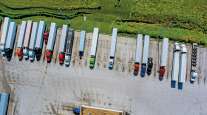Ohio Town Grapples With Truck Parking Woes

When truck driver Grant Moser returns to Huber Heights, Ohio, in a few days after making his way back from California, he’ll face a choice more complex than it might seem: Where to park?
“The thing is, if I can’t park the truck in my driveway, where can I park it?” asked Moser, a truck driver from Huber Heights who said he was recently warned by the city about parking his truck cab in his driveway. “It’s just a royal pain.”
Speaking by phone while dropping off a load at a Costco in Tracy, California, Moser said he’ll likely drop his trailer off behind a local strip mall, but he’ll need to determine whether he’ll tempt local code and park the cab in his driveway again.
RELATED: Tiny Washington town's parking woes mirror growing nationwide shortage
“I really don’t have much of a choice other than park in my driveway or take my chances in the strip mall shopping center a little ways from my house,” he said, noting his cab has many of the same amenities as a home, such as a television and a microwave.
“There’s a lot of money in here,” he said. “I live in the truck, and I go home to visit two days a month.”
American Trucking Associations routinely reports the lack of adequate parking for tractor-trailers is a national issue, especially when combined with government-mandated sleeping and rest requirements.
The issue is amplified in communities such as Huber Heights, which sits at the crossroad of two of the nation’s major interstate highways. Local truckers who come home to Huber Heights cannot park in their own driveways, while out-of-town drivers spending the night cannot find a place to legally park and rest.
More than a decade ago, this newspaper reported on another issue compounding the problem: the closure of the last truck stop in Huber Heights.
“We did away with the truck stop on Executive [Blvd.] many, many years ago,” said Mark Bruns, executive director of the Huber Heights Chamber of Commerce, referencing the Dayton Truckstops location shuttered and razed in the 1990s to make way for a Target store. Before that, the stop was a favorite long-term parking site for transient and local truckers.
Drivers said the problem has not improved despite some attempts from local business owners to assist.
“We kind of saw a niche for the drivers here in Huber to be able to park,” said Tim Hart, who owns i70 Paintball and offers modestly priced parking for truck drivers at his Wildcat Road business.
“We kind of felt sorry for them because the police would run them off,” said Hart, a former truck driver. He argues there should be “two or three places strategically placed” across Huber Heights where drivers can park “at least overnight.”
Moser’s wife, Teresa, said parking the truck behind the strip mall is a “recipe for disaster,” and said there’s plenty of room in their driveway to park the cab without overlapping the sidewalk.
Homeowners aren’t the only ones who’ve found the parking shortage challenging.
In April, a Riverside, California, truck driver complained that Meijer in Huber Heights towed his vehicle one morning while the driver was inside the store. The Michigan-based retailer told this newspaper there were nearly 20 trucks in the lot that morning, “which made it difficult for us to receive deliveries.”
“Our Huber Heights store has consistently tried to work with drivers who shop at our store, and we did attempt to wake/locate the drivers. Unauthorized trucks parking in our lot have been a major issue at this store location,” a Meijer spokesman said at the time.
Huber Heights Councilman Richard Shaw is leading an effort to attempt to figure out answers to the problem, either by establishing lots for trucks or amending the zoning code. Research he’s done on the issue has found municipalities have dealt with the issue in a variety of ways, including the establishment of municipal parking lots.
He understands the concerns of residents about having trucks parked in the neighborhoods and also the damage the trucks can cause residential streets. But he also sees solving the trucking issue as an opportunity for growth in the city.
“These trucks are hurting the residential streets, and they do have an impact on businesses as well,” Shaw said. “But on the flip side of that, if we’re a city that embraces commercial trucking, as we have an abundance of commercial truck businesses in the city, I believe that will open up new economic development opportunities.”




